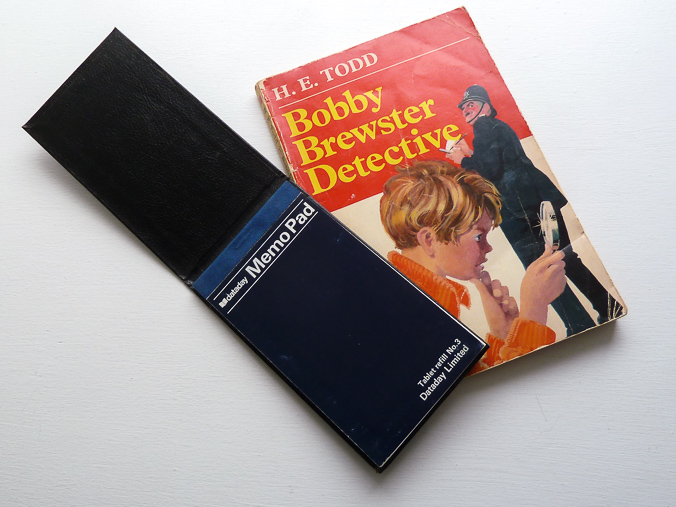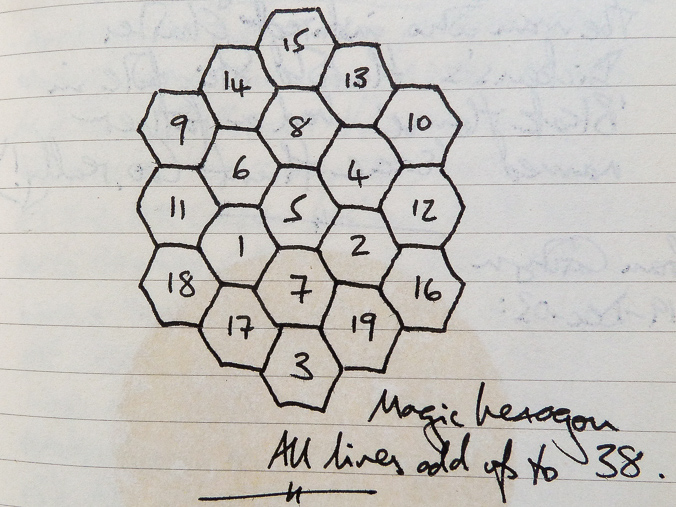The very first time he saw it in the shop Bobby Brewster decided that he simply must buy it as soon as he could. It was a smart-looking silver badge packed in a very important-looking black wallet. The badge was in the shape of a shield, with a star in the middle, and round the star were the impressive words ‘International Private Investigator’. Inside the wallet was an identification card ready to be filled in by the owner, and in the pocket of the wallet was a notebook headed ‘Investigations’.
—H.E. Todd, Bobby Brewster Detective (1964)
Bobby Brewster is almost certainly to blame for my near-life-long addiction to notebooks. The very first time I read H.E. Todd’s Bobby Brewster Detective, aged six or so, I knew I simply had to have a notebook like his. So I began to pester my mum.
And here it still is, forty-four-or-so years later, at the top of my box of unused notebooks: my Dataday 443 Memo Pad—untouched, save for the first 20 pages torn out decades ago. I wonder what on earth I wrote on them.

That’s the problem with notebooks: having something worthwhile to write in them. When they’re pristine, it seems sacrilege to mark their pages—especially with handwriting like mine. Once you do pluck up the courage to write something, they’re ruined forever. So, over the years, I became a great notebook hoarder, safely filing away each new notebook for some undefined future use.
Then, in 2003, I spotted something in a borrowed book. It seemed like the sort of thing I might possibly need to refer to in future. It was a diagram, a totally cool diagram: just the sort of thing you might find in Indiana Jones’s dad’s diary. So, with trembling hands, I slit open the Cellophane around one of my dozen or so unopened Moleskine notebooks, wrote my name and address in the front, and made the following note:

My virgin notebook had been sullied.
A few weeks later, travelling on the train to meet a friend for beers, I overheard an amusing conversation, and jotted down a second notebook entry:
Train, Brom—Bhd 15/12/03 – Two girls approx 14. One fat, one thin.
Fat girl: “Me & Lee are 2nd-best mates: we confidise in each other—I can’t even say the fucking word—con-fid-ise!“
From then on, whenever I heard or saw or thought of something amusing, or something happened that I felt I might need to refer to again in future, I would jot down a quick notebook entry. Themes began to develop: brief holiday journal entries; seasonal sightings from the natural world; words and phrases that look as if they should be opposites, but aren’t; amusing conversations with friends and family; malapropisms of British idioms; ideas for jokes and crossword clues; significant world events; interesting trivia picked up here and there; and so on. The notebook turned into an eclectic mix, with what I thought of as noteworthy being the only unifying theme.
And then, three years after recording my first tentative notebook entry, I found myself on the final page:
27-Nov-2006: After all these years of collecting notebooks, I’ve finally managed to fill one. That was fun!
…to be continued.
I’m currently about half-way through my tenth notebook. The other week, I was asked to dig out some Florence restaurant recommendations. It was only as I was sifting my notebooks for this important information that it occurred to me that I have never actually gone back and read through them all. So, out of idle curiosity, I opened Moleskine No.1 and began to read.
I spent the next hour or so howling with laughter at all the funny conversations I had forgotten, some of them—especially those with my late mum—bringing tears to my eyes. My notebooks, it turns out, are packed with hundreds of happy memories. Stuff that I somehow knew was important for me to note down. Stuff that needed remembering.
All of which got me thinking. Time moves on. The fat girl on the train will be in her mid-twenties by now. I wonder if she and Lee are still second-best mates. I hope so. Either way, their one-time confidising friendship lives on in my notebook—and, I hope, in their memories.
In the absence of immortal souls, our memories are what makes us us. Anything that helps us retain them has to be a good thing. Why risk forgetting? Why not use whatever tools are to hand to help preserve this precious stuff? Nobody ever said, “He left a lovely collection of pristine notebooks”. Life’s too short. Get the buggers filled!

Leave a Reply